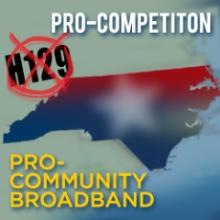By
on

Last year, we put together a report with graphs showing how superior the community fiber networks are compared to incumbent operators like AT&T and Time Warner Cable. When we released the report, we noted that Time Warner Cable would almost certainly push legislation in 2011 to limit local authority to choose to build locally owned networks.
Sadly, we were right. On Friday, North Carolina's Governor Perdue bowed to the pressure of TWC, CenturyLink and other companies that want to limit competition. She refused to veto a bill written by those companies, for those companies, that will ensure local businesses and residents will have fewer choices and higher bills when they connect to the Internet.
In February, we dug into TWC's H129 to explain how it threatened the future of broadband access in the Tar Heel state. It was the first of more than 30 posts we wrote since, reporting very closely on its path through a legislature effectively controlled by big-money corporations.
North Carolina has become the first state in perhaps 5-6 years to enact new barriers to prevent communities from building their own broadband networks, even when the private sector has refused to invest. Advocates of the bill pretend it exempts rural areas with little broadband access, but that section was carefully amended by lobbyists to effectively apply to no one.
Below, you'll see the video we produced that shows the real threat TWC and CenturyLink were responding to - the embarrassment of offering anemic, overpriced services compared to networks like Salisbury's Fibrant and Wilson's Greenlight.
We hope that voters will remember whether their elected officials, including Governor Perdue, represented the people and small businesses of the state or simply parroted talking points from an industry that has dumped millions of dollars into the Legislature to buy new regulation to kill the only likely source of broadband competition.
 Governor Perdue ignored more than 2,000 phone calls begging her to veto a bill she agreed could "have the effect of decreasing the number of choices available to their citizens."
Her concern?
Governor Perdue ignored more than 2,000 phone calls begging her to veto a bill she agreed could "have the effect of decreasing the number of choices available to their citizens."
Her concern?
 Governor Perdue ignored more than 2,000 phone calls begging her to veto a bill she agreed could "have the effect of decreasing the number of choices available to their citizens."
Her concern?
Governor Perdue ignored more than 2,000 phone calls begging her to veto a bill she agreed could "have the effect of decreasing the number of choices available to their citizens."
Her concern?
There is a need to establish rules to prevent cities and towns from having an unfair advantage over providers in the private sector.One might as well push for legislation to prevent ants from having an unfair advantage over children with magnifying glasses. Or for legislation protecting NFL running backs from the threat of middle-school linebackers. While local governments may have one or two tools available to them that are not available to the private sector, massive companies will tens of billions of dollars in revenue have far more advantages than any local government. Additionally, incumbents naturally have multiple advantages over any overbuilder -- pro-competition legislation should seek to remove unfair incumbent advantages, not increase them. Perhaps the most fascinating aspect of this rough-and-tumble battle in North Carolina was the utter lack of discussion about what communities need for economic development, quality of life, and such. Whenever Representatives from rural areas tried to talk about what their communities needed, those pushing the bill (Avila was the worst) said that discussion should be held another time -- but it was always clear that this was the one broadband bill leadership wanted to succeed. It was quite clear that to those in the legislature supporting TWC's bill, an unreliable, overpriced connection to DSL was no different than a far more reliable and affordable connection via a next-generation fiber-optic network. And even though AT&T is cutting future investment while imposing new limits on how much of their service subscribers can use, most of the legislature effectively said "more power to them." As long as TWC and CenturyLink can cut those big campaign checks, too many elected leaders have no interest in what is really necessary for North Carolina's communities to thrive. We must learn from this struggle and move on to find ways of expanding affordable, fast, and reliable access to the Internet to everyone. This will now be harder in North Carolina, but voters can change that in coming elections, if they so choose. As always, anyone interested in helping to defend and increase local authority to build networks, donate to make sure we can continue this important work. For those interested in a wider look at the threat of corporate power to democracy, check out Larry Lessig's Rootstrikers.org. Only by continuing to organize can we balance the massive power of corporations like Time Warner Cable.
Geoterm







